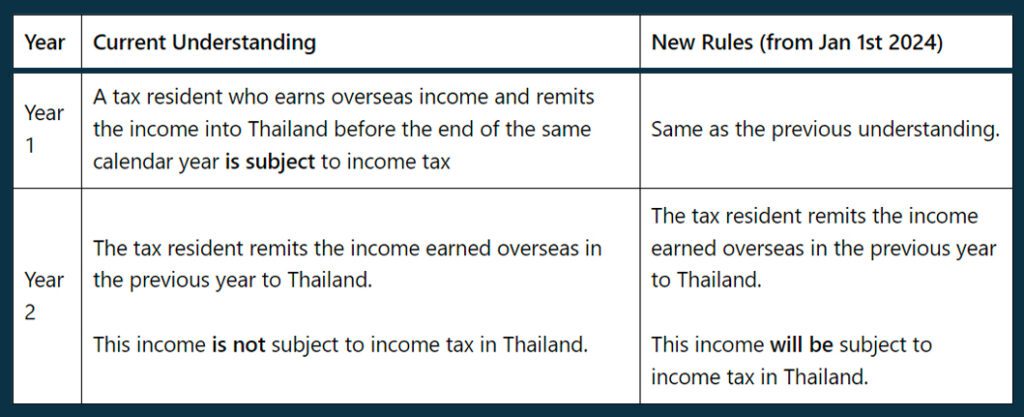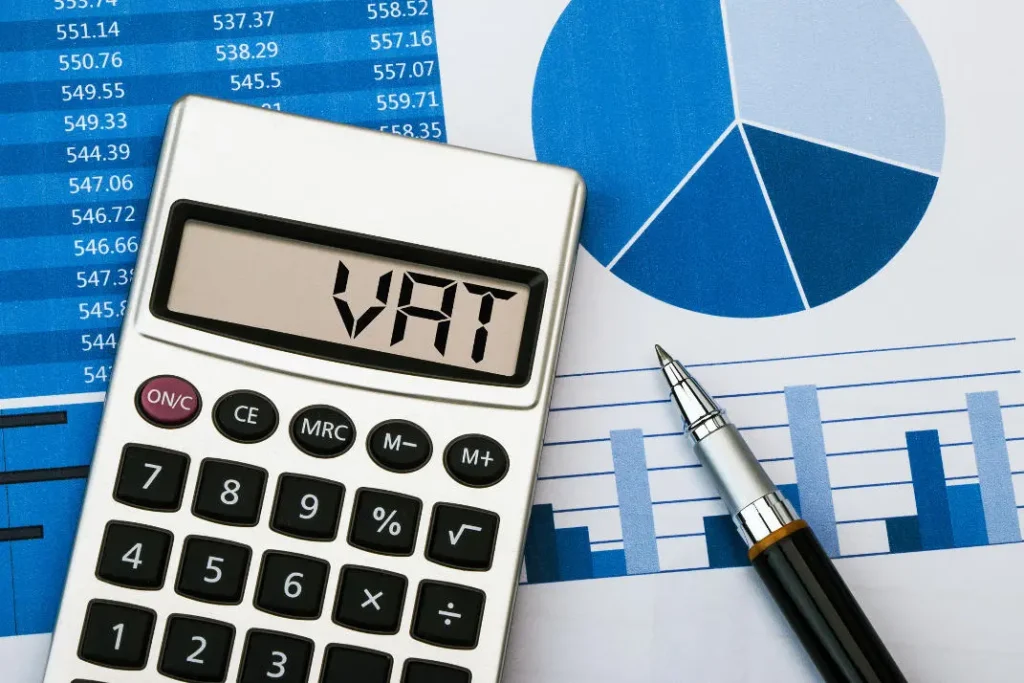Introduction
In Thailand, tax residents are typically not subject to personal income tax on foreign sourced income that has not been remitted to Thailand. Until recently it was possible to remit foreign sourced income after one fiscal year and not be subject to tax on this income. However, due to the Revenue Department’s interpretation of Section 41, paragraph 2 of the Revenue Code, numerous Thai tax residents, whether Thai citizens or foreign individuals, have enjoyed exemption from paying personal income tax on income earned abroad.
This exemption has made Thailand an attractive destination for both Thai nationals and foreigners who rely on this tax benefit to safeguard their foreign sources of income from taxation. Nevertheless, significant changes are on the horizon, as the Revenue Department is set to implement new regulations starting on January 1, 2024 which completely change this.
Key Points
- Currently, tax residents in Thailand are exempt from personal income tax on overseas income remitted into Thailand the following calendar year.
- From January 2024, tax residents will be required to include overseas income remitted into Thailand in their annual assessable income, regardless of the year of its origin.
- The new regulations WILL NOT apply to any foreign-sourced income earned by Thai tax residents before the 31st of December 2023.
- Exemptions available for tax include Double Tax Treaties, the Long-term residency visa (LTR – see articles here and here, realising their outstanding income before the end of the year or keeping their income abroad to avoid Thai income tax obligations.
What are the current rules for the taxation of foreign income remitted to Thailand?
Thailand has traditionally primarily focused on income generated within the country’s borders (territorial income), owing to the Revenue Department’s strict interpretation of Section 41, paragraph 2 of the Revenue Code. According to this interpretation, a Thai tax resident is only obliged to pay Thai personal income tax on overseas income if two specific conditions are met:
- The tax resident of Thailand earns overseas income within a calendar year.
- The tax resident of Thailand subsequently brings this overseas income into Thailand within the same calendar year, adhering to a same-year remittance rule.
This interpretation has allowed Thai tax residents, including foreigners residing in Thailand for at least 180 days in any calendar year, to effectively circumvent the obligation of paying Thai personal income tax. For instance, an individual could generate overseas income in 2022 and retain the funds abroad until at least January 1, 2023, before transferring the funds to a Thai bank account, thus remaining exempt from Thai personal income tax liability.
How does the new instruction from the Revenue Department affect Thailand Income Tax for foreign income remitted to Thailand?
On September 15, 2023, the Director General of Thailand’s Revenue Department issued Departmental Instruction No. Por. 161/2566. This new instruction carries significant implications for interpreting Section 41, Paragraph 2 of the Revenue Code. This instruction, titled “Payment of Income Tax under Section 41, Paragraph 2 of the Revenue Code,” redefines Thailand income tax for tax residents who earn income from foreign sources in a given calendar year and repatriate this income to Thailand in any subsequent calendar year.
Under this new interpretation, Thai tax residents are now obligated to include such assessable income when computing their annual assessable income for the calendar year they remit the overseas income into Thailand. This means that Thai tax residents are now required to fulfil their Thai personal income tax obligations on such overseas income, even if the repatriation of the income occurs in a different calendar year from the one where the overseas income was initially earned.
A Tax resident in Thailand is a person who has stayed in Thailand for at least 180 (does not have to be consecutive) days in the year.
The effective date of the new regulations are set for January 1, 2024.

Do the new income tax regulations apply to income earned before Jan 1st 2024?
The Revenue Department has explicitly stated that the new Thailand income tax regulations will not apply to any foreign-sourced income earned by Thai tax residents before the 1st of January 2024.
Therefore, tax residents do not need to include any foreign-sourced income earned before the 1st of January 2024 in their personal income tax returns. This will also apply to any income brought into Thailand from 1 January 2024 onwards.
What options are available to Thai tax residents?
With the new amendments coming into force in January 2024, tax residents of Thailand who previously relied upon this exemption for foreign income are now looking for ways to protect their income. Some possible options for such tax residents include:
Cashing in on any unrealised income:
If you are in a position where you have unrealized foreign-sourced income, it is recommended to consider cashing in this income or gains before the end of 2023. By cashing in on any unrealised income would mean this income will not be taxable if remitted into Thailand on or after 1 January 2024. However, please note, this income needs to be realised before the end of 2023.
Double Tax Treaties:
When an individual has generated income and fulfilled their tax obligations in the country of income origin, and if a Double Tax Agreement is in place between Thailand and the respective foreign country, the taxpayer can apply the taxes already paid in the foreign country as a tax credit.
Long-Term Residency visa (LTR) holders:
Individuals holding an LTR visa are eligible for an exemption from Thai personal income tax on overseas income repatriated to Thailand, as per Royal Decree No. 743, as authorized by the Revenue Code.
Keeping the income abroad:
If it is not possible for you to realise any outstanding income before the end of 2023, the simplest option would be to keep the income earned overseas outside of Thailand. This income would then not be subject to the new income tax regulations in Thailand. However, this may be problematic for tax residents relying on this income.
Our Thoughts
As the landscape of foreign income taxation in Thailand undergoes a significant shift, tax residents need to adapt to the upcoming changes. For those with unrealized foreign income, seizing the opportunity to cash in before 2024 ensures tax-free remittance post-January 1.
For those who this isn’t possible, leveraging Double Tax Treaties where possible becomes vital for international tax planning, offering relief by crediting taxes paid abroad. Long-Term Residency visa holders enjoy exemptions, and our advisory services provide tailored solutions, guiding clients through these changes with expertise in strategic income management and comprehensive support. Contact us for a consultation with one of our tax experts on navigating the new foreign income tax regulations in Thailand.
These regulations are being pushed to OECD and will apply technically to revenue from 2024 declared in 2025 and by this point there may be changes to the regulations introduced. Our experts will monitor the situation closely and keep you up to date with any developments as and when they happen.





